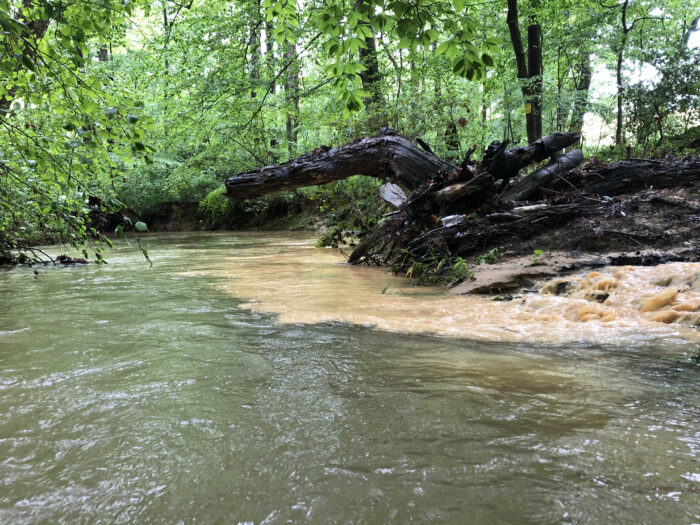Clean water win: Stopping dangerous development practices in Alabama
New housing projects can be a significant source of pollution for Southern waterways. That was the case along the Shelby County Dunnavant Valley Greenway near Birmingham, where a new development left visible streams of sediment, violating the Clean Water Act and negatively impacting a popular recreation area for families.
Last year, SELC stepped in, filing a lawsuit on behalf of the Coosa Riverkeeper against Newcastle Homes for consistently violating the Clean Water Act in Shelby County.

“Developers should realize that clear-cutting and then placing a subdivision on a mountain without phasing the development or maintaining any trees has a price,” said Sarah Stokes, Senior Attorney for SELC in Alabama. “This settlement is a step in the right direction in bringing Newcastle back into compliance.”
In total, Coosa Riverkeeper documented more than 150 instances where Newcastle Homes violated its stormwater permit at its Melrose Landing construction site. The 78-lot subdivision is adjacent to the Shelby County Dunnavant Valley Greenway. Collecting samples along the North Fork of Yellowleaf Creek, a tributary to Lay Lake, Coosa Riverkeeper found that the developer discharged sediment 12-14 times over what its permit allowed.
In June, SELC reached a settlement with Newcastle Homes on behalf of Coosa Riverkeeper. The settlement requires the developer to repay the Riverkeeper $39,750 for monitoring expenses. Additionally, Newcastle Homes will be fined $500 to $1,000 for every future infraction. Under the settlement, these fines will be paid to Big Canoe Creek Partners, whose mission is to preserve Big Canoe Creek Preserve, a 422-acre preserve on a tributary of the Coosa River in Springville.
This is a victory for everyone who loves and appreciates the beauty of the North Fork of Yellowleaf Creek.
Justinn Overton, Coosa Riverkeeper
Under the Clean Water Act, developers must utilize best practices to prevent uncontrolled volumes of sediment and mud from being washed away into downstream waterways and reduce the turbidity, a measure of water clarity. Stormwater runoff and the sediment that comes with it harms water quality, putting businesses and wildlife that depend on clean water at risk, damages public and private property, and increases water treatment costs for communities.
“After violating its permit for years, we are hopeful that this settlement will stop Newcastle from polluting Yellowleaf Creek, once and for all,” said Justinn Overton, Staff Riverkeeper at Coosa Riverkeeper. “This is a victory for everyone who loves and appreciates the beauty of the North Fork of Yellowleaf Creek who should not have to compromise healthy waterways for development interests.”
The Coosa River has been identified by American Rivers as the nation’s fifth most endangered river in 2022, largely due to the impacts of agricultural operations including poultry facilities and runoff from urban centers and development.
SELC continues to defend the South’s waterways. By protecting our oceans, rivers and streams, we ensure clean drinking water and protect the region’s most treasured recreation areas. Our work is vital to safeguard our way of life for future generations.
